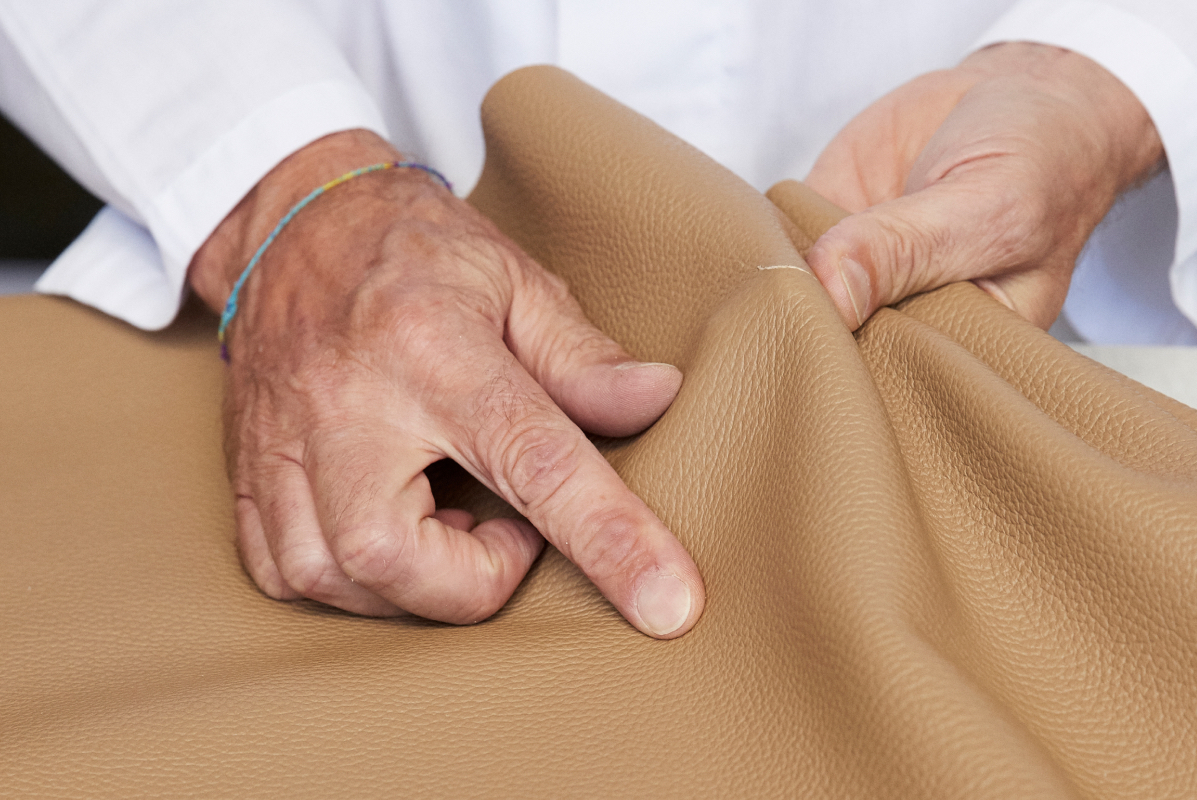It’s curious that “vegan”—a word that’s typically used to describe consumable food and drink free from animal products—has become a buzzword in the sustainable fashion space.
At Cuyana, we’re always on the lookout for innovative new materials and textiles that deliver uncompromised quality, while also treading lightly on the planet. So you might be surprised to learn that at present, vegan leather doesn’t meet our sustainability criteria or help us fulfill our fewer, better ethos. In this post, we’ll explain some of the pros and cons of vegan (sometimes called “plant-based”) leather, as well as how it compares to the leather products Cuyana sources from heritage tanneries in Italy and Argentina.
As noted in Forbes by sustainability-focused writer Brooke Roberts Islam, vegan leather is perhaps best suited as a “marketing term rather than a descriptor of ingredients.” That’s because the majority of the vegan leathers on the market—including those derived from plant biomass like coconut husks and pineapple leaves—actually contain synthetic polymers, or plastic. These composite materials are used to bolster plant matter to create a product that doesn’t fall apart. Mycelium, a popular alternative leather made of fungi roots, is either combined with synthetic polymers or finished with a polyurethane (more plastic) coating. Though one manufacturer offers a product that has less than 1% plastic content, the intensive manufacturing process is so expensive it can’t yet be used as a viable alternative to leather.
All of this begs the question: Can something made of plastic be called vegan, or even sustainable for that matter? Cuyana’s goal is to eliminate plastics in all of our products as much as possible—only using recycled polymers where necessary, such as in our Recycled Sling Bag and Recycled Overnight Bag.
By comparison, leather is repairable, durable, and offers unparalleled longevity – something that plant-based polymer alternatives either can’t claim or have yet to prove. In addition, in almost all cases, the leather hides used to make handbags, shoes, and apparel are a byproduct of the animal agriculture industry. In fact, 99% of leathers come from livestock, which means it is a byproduct of the meat industry. In other words, the carbon emissions, animal suffering, and potential deforestation would take place whether or not the animal hide was used to make a handbag or shoe.
There’s perhaps a good reason why vegan leather has felt so alluring in a more environmentally conscious time: a lack of awareness about where real leather goods come from. A consumer sentiment study commissioned by trade group Leather UK found that only 24% of UK consumers were aware that leather is a byproduct of the beef industry which would otherwise go to waste. In other words, buying a leather handbag isn’t the same as ordering a steak for dinner every week. In fact, due to shifting consumer tastes, there is a glut of hides on the market that get burned or sent to landfill to rot if they are not used.
To be clear, we believe there is undoubtedly exciting and meaningful innovation happening in the realm of plant-based materials and leather alternatives. Mylo is one promising example. But as of yet, these products do not come close to matching everything that leather has to offer.
It’s also important to note that leather is not sustainable simply by virtue being a byproduct of animal agriculture. Other stages of the supply chain—such as the chemical processing that happens during tanning—can introduce harmful impacts on the environment, and labor issues are always a concern. So it is important that brands using leather look at the whole supply chain. At Cuyana, all of our tanneries are certified by the Leather Working Group, which provides the leading environmental certification for the industry and regularly updates its auditing standards. Notably, the LWG has recently begun tracing leather pre-slaughterhouse to account for the impacts of deforestation.
Our underlying principle at Cuyana is creating fewer, better products that stay in your closet for longer and offer season after season of versatile, timeless wear. While vegan leather might seem like a compelling alternative for a trend-driven handbag, it doesn’t align with our deeply-held intention to take responsibility for the entire lifecycle of every product we sell. Indeed at present, there are few materials that serve our fewer, better brand ethos better than responsibly-sourced leather.


Leave a Reply